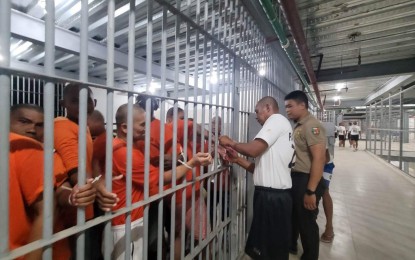
TRANSFER. Inmates are processed during their transfer from the New Bilibid Prison in Muntinlupa to Davao Prison and Penal Farm (DPPF) in Davao Del Norte in this photo taken March 16, 2024. The transfer is part of the continuing master decongestion plan of the Bureau of Corrections. (Photo courtesy of Bucor)
MANILA – Around 500 persons deprived of liberty (PDLs) from the New Bilibid Prison (NBP) in Muntinlupa were transferred this week to Davao Prison and Penal Farm (DPPF) in Davao Del Norte as part of the continuing master decongestion plan of the Bureau of Corrections (Bucor).
In a statement, BuCor on Friday, Director General Gregorio Pio P. Catapang Jr. said the PDLs left the NBP on board 15 buses on March 16 and arrived on March 18 at DPPF.
They were escorted by 144 corrections officers composed of medical personnel, a SWAT (Special Weapons and Tactics) Escort Team headed by CSINS Roberto Butawan, and assisted by the Philippine National Police and the Armed Forces of the Philippines.
“The transfer of PDLs from various operating prisons and penal farms is also part of our preparation for the closure of the NBP,” Catapang said.
After-care program for PDLs
Catapang said he will also study the possibility of an after-care program for persons deprived of liberty (PDLs) who have been released from the correction facilities.
Catapang was a resource person Friday morning together with Pastor Gary Galvez, who is a former PDL, at the Agenda forum at Club Filipino in Greenhills, San Juan hosted by former Immigration Commissioner Siegfried Mison.
Galvez, who shared his experience as a former PDL, told Catapang that one of the programs lacking for PDL is the after-care program.
He narrated that when a PDL is released after serving his sentence, or after being paroled, they do not know what to do and where to go, especially those who do not want to go back to their families or have no families at all.
Catapang said it was an “eye-opener” and vowed to look into the issue. (PNA)
